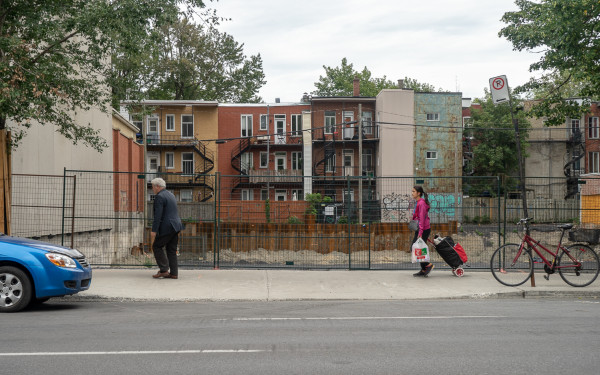Salvaging the White Elephant
Support the Student Housing Co-Op That Could Save a Neighbourhood
Îlot Voyageur is a classic example of a white elephant. The money ran out and the whole thing became more trouble than it was worth. Stranded like a beached whale, it’s large, idle and has a price tag that would make your grandmother blush.
The six-story disaster—which rises up gloomily above the Quartier Latin—resembles, with its pale, naked concrete frame, the decaying bones of a long-dead behemoth more than an abandoned building.
The Îlot—located in the city block formed by St. Hubert St., de Maisonneuve Blvd. E., Berri St. and Ontario St.—was a development project that went belly-up in 2007.
The Université du Québec à Montréal had partnered with property management firm Busac Real Estate to build the complex, which was to include a university pavilion, housing for 1,100 students, parking, office spaces and the city’s central bus terminal.
But cost overruns eventually put the university in a precarious financial hole—leaving it almost $300 million in debt—and in 2010, the Quebec government was forced to take control of the project by buying the uncompleted building. Since then, buyers have been reluctant to invest in the failed complex, whose eight-foot ceilings can only serve a residential purpose.
Now, private firms are finally ready to purchase the northern part of the Îlot and turn it into condos—but a student-led group called L’Unité de travail pour l’implantation d’un logement étudiant says not so fast.
UTILE has an exciting plan that, if it succeeds, will inject a much-needed breath of fresh air that could turn this ghost-like building into an oasis of affordable student housing.
A New Life for Îlot Voyageur?
UTILE is a non-profit organization composed of UQAM and Université de Montréal students specializing in urban planning, finance and communications. They wish to convert the two northern structures of the complex into an affordable student-housing co-op independent of both universities.
With an additional two floors added to the original six, the co-op would have 634 apartments and would cost an approximate $46.6 million—$9.3 million of it in government subsidies.
Inspired by the highly successful L’Estudiantine project in Sherbrooke, it will aim to be completely self-sustainable, run in such a way as to be financially viable. But while the explicit details of the co-op’s organization remain nebulous, the group must first acquire the building itself. The question is, should the government sell it to them?
On Sept. 24, 2012, a Special Planning Program for the Quartier des Spectacles was adopted by city council.
This urban planning document is the blueprint for the Quartier Latin’s grand makeover—phase two of the revitalization of the Quartier des Spectacles. According to the document, the city wishes to cater to a young, trendy, professional clientele while also making it a unique destination for culture and learning.
On the latter front, the new Centre Hospitalier Universitaire de Montréal is currently being built alongside UdeM’s new Norman-Bethune Public Health Campus in the southern corner of Îlot Voyageur. There are also plans to build new condo-style lodgings in the area, much like the ones we’ve seen popping up all over the city.
There’s only one problem: with 46,000 students currently frequenting the area, and thousands more to come with the arrival of two new educational complexes, where is the affordable student housing?
“There is no model for affordable student housing that works right now in Quartier Latin,” says Laurent Levesque, UTILE’s project director. “For decades, we’ve developed student housing through universities. When people see Îlot Voyageur, they think of scandal and of UQAM. It needs to be someone independent.”
Levesque says that with the city’s development plans, rent prices are likely to rise dramatically in the area, which will affect students. Three thousand new apartments are being built, but not with a cost that rhymes with “affordable for students.”
It seems that whoever is writing these plans has the wrong set of priorities, however. Investing in new buildings for people with thicker wallets doesn’t reflect the lifestyle of the less-privileged student population that has lived here for decades and has almost single-handedly defined the Quartier Latin.
Students Are the Foundation of the Quartier Latin
Since 1876, when Quebec City’s Université Laval inaugurated an affiliate pavilion there, student populations have flocked to the Quartier Latin—and have given it a student-centric identity.
In the 1920s, the Université de Montréal had its beginnings there also, as did UQAM and the CEGEP du Vieux-Montréal in the ’60s and ’70s.
“This is the population that comes in every day to this neighbourhood that makes it live, that makes it breathe, that gives it soul. But now, this might change with the transformations [proposed in the Special Planning Program]. They don’t recognize that the livelihood of the neighbourhood is due to the student population,” said Levesque.
The Quartier Latin has always been known for its students, who have in turn brought vitality, culture and artistic flair to the area.
Local businesses are built on the student activity in the neighbourhood, and to ignore the needs of this population is understandably causing people to scratch their heads. It seems like the planners behind the program want to weed out students by not addressing their need for affordable housing.
UTILE’s co-op project will accept tenants based on their student status and level of involvement in the project. With an average rent of $500 a month, the co-op will be open to students from any university in the area, even international students.
“We’re thinking about reserving a portion of the rooms for shorter-term housing, on a 12-month or semester-long lease. It’s necessary to open up student housing for international students,” said Levesque.
“It’s not easy to develop a project like this. The reason it didn’t happen earlier is that there’s no model outside universities. We’re trying to break the mold of student housing in Montreal.”
- Laurent Levesque, UTILE’s Project Director
Levesque also addressed the recent scandal at Concordia involving the poor living conditions of some international students. In September 2012, The Link published an article about Concordia students from China who were being mistreated in homestays arranged by a shady student recruiter who also worked for the university.
A student housing co-op like the one proposed by UTILE could help eliminate such abuse. Run by students, for students, it would provide a communal, affordable and sustainable environment in the heart of Montreal’s student haven.
Instead of relying on external recruiters, international students could enjoy living in a shared space that they are responsible for. It’s a better way to fully experience the best of student life while leading a self-managed lifestyle in housing that can teach them how to be independent.
So why hasn’t such a simple and potentially effective idea been tried before?
As it turns out, co-op housing has existed in Quebec since the 1960s, and has worked very well. But Levesque says that the Société de l’habitation du Québec is hesitant to address the issue of student housing because student poverty is transitional and temporary, choosing instead to focus on families, elders and people with disabilities.
“It’s not easy to develop a project like this,” said Levesque. “The reason it didn’t happen earlier is that there’s no model outside universities. We’re trying to break the mold of student housing in Montreal.”
UTILE Deserves a Chance
It seems clear that the fate of Îlot Voyageur belongs to the ones who deserve it most. We have spent all this money on UQAM’s failed attempt, so why give away what remains to the private sector?
We will be paying for this misadventure for the next 30 years, so we might as well get something good out of it for the people the building was originally supposed to house.
The Quartier Latin’s identity is deeply intertwined with student life, and it is only natural that it continue on like this. Urban development is important, yes, but so is the need to provide adequate lodging for the students who give the area its vitality.
Allowing UTILE to buy the structures from the government of Quebec is a step in the right direction in honouring Quartier Latin’s vibrant roots.
Let’s hope that upcoming reports by the Office de consultation publique de Montréal on the city’s development plan shed more light on the lack of affordable student housing—and that something will be done about it.
Update: In the original version of this article, the name of UTILE’s project director, Laurent Levesque, was misspelt. This version has been updated to correct the spelling. The Link regrets the error.

_900_514_90.jpg)



2_600_375_90_s_c1.jpg)

